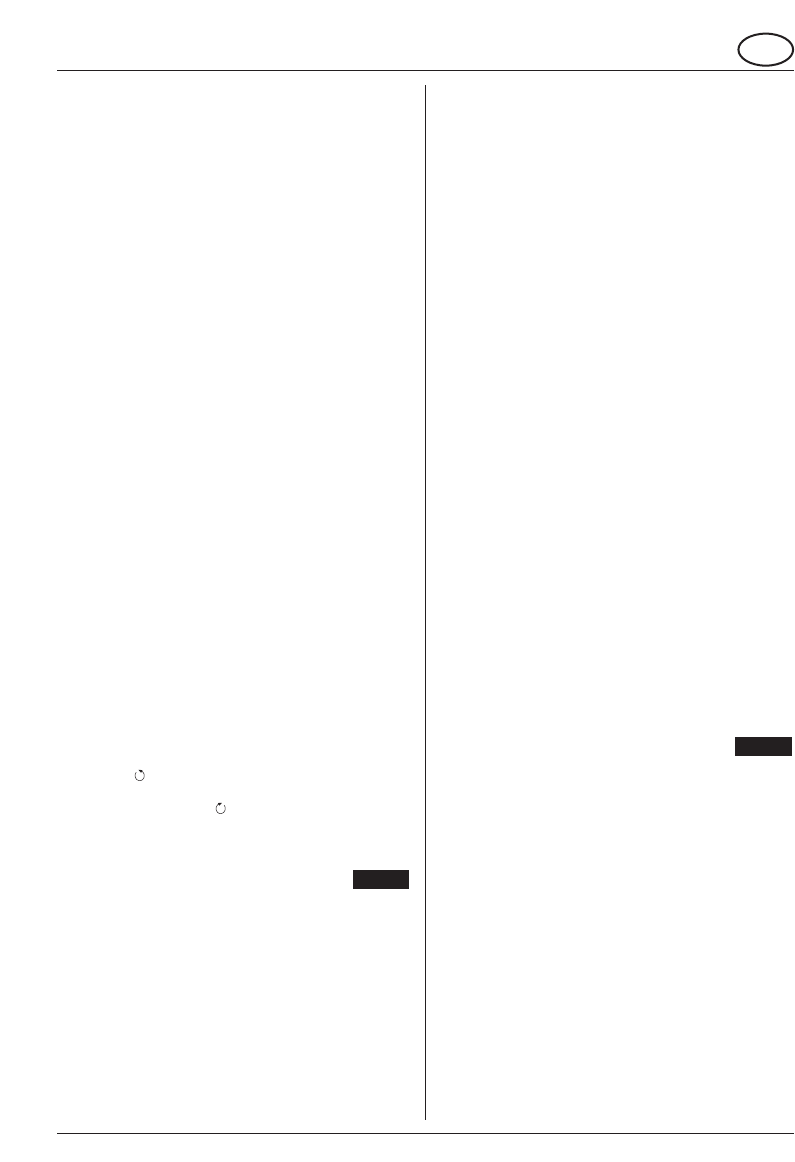
Do not smoke when re-fuelling.
Always open the fuel cap slowly.
Re-fuel in open spaces only, keeping away from naked fla-
mes or sparks.
Always store fuel in an approved container.
SAFE STORAGE OF FUEL
Petrol is highly inflammable. Put out all cigarettes, pipes and
cigars before working with petrol. Avoid spilling petrol. Store
fuel in a cool, well ventilated place, in an approved container
specifically designed for the purpose.
Never store engine with fuel in the tank in enclosed, poorly
ventilated areas, where fuel fumes may reach an open flame,
spark or pilot light such as in a furnace, water heater, clothes
dryer etc. Petrol fumes can cause an explosion or a fire. Do
not store large amounts of fuel.
CHAIN LUBRICATION
IMPORTANT
The service life of the bar and chain depends on good lubri-
cation.
Always use chain lubricating oil of medium viscosity. We
recommend special McCulloch chain lubricating oil.
Never use waste oil for this purpose. This results in damage
to the bar, the chain and the oil pump.
Refill the chain oil tank each time the saw is refuelled.
IMPORTANT
The chain oil feed is reduced to a minimum when the regula-
ting bolt is completely closed (turning clockwise)
To prevent possible restarting problems avoid running the
fuel tank dry. This also helps to extend engine life.
NOTE: Saw chain stretches during use particularly when it
is new, and it will occasionally be necessary to adjust and
tighten it. A new chain will require adjustment after about
5 minutes of operation.
• The mechanical oil pump for chain lubrication can be
adjusted.
The feed rate of the chain oil pump can be adjusted by means
of the regulating screw (A) (see details in the illustration). The
oil feed rate is increased by turning the regulation bolt coun-
terclockwise .
IMPORTANT - The chain oil feed is reduced to a minimum
when the regulating bolt is completely closed (turning
clockwise).
STARTING AND STOPPING
IMPORTANT. Never start or operate unless bar and chain
are properly installed.
Before starting always move the saw away from the fuel-
ling area and place it on firm, flat surface, the guide bar to
the front.
STARTING COLD ENGINE
Check that the chain brake is in the disengaged position
moving the lever (L) backwards (towards the front handle).
Move the stop/run lever (A) up to the cold start position
(choke closed |
––
•|) When in the cold start position, this lever
also partially opens the throttle. Activate the decompression
pressing the valve (D).
E
Hold the saw firmly as shown in illustration and pull the starter
rope until the engine fires once.
Once you hear the engine start, or attempt to start, move the
stop/run lever (A) to the intermediate position (choke open
|
––
•|| ). Re-activate the decompression system by depressing
valve (D).
ATTENTION: The throttle remains partially open in this position
and the chain may run. This allows the engine to warm up.
Pull the starter rope until the engine starts.
Allow engine to warm up for a few seconds, holding the saw
firmly.
Beware of moving chain.
ATTENTION: Squeeze and then release the accelerator trig-
ger (B). This will allow the throttle too close and the chain
should no longer move.
STOP
To stop the engine, move the stop/run lever (A) down, to the
“STOP” position.
IMPORTANT. After lengthy use of the chain saw at full
speed, we recommend to run the engine for a few seconds at
idle speed before stopping it.
STARTING A WARM ENGINE
Leave the start/run lever (A) onto the run position (in the
middle). Press valve (D) for decompression and pull the star-
ter handle until the engine runs.
IMPORTANT: The automatic accelerator opening system
will only function if the start/run lever (A) is moved up to
the cold start position, and then back down to the run
position (in the middle). Do this if the engine fails to run
after starting.
STARTING A WARM ENGINE AFTER FUELLING
In the fuel tank as run completely dry, procede to start as with
a cold engine.
USAGE
IMPORTANT
Before using a chain saw read the Operator’s Manual and all
safety precautions carefully.
FELLING TREES
– Make sure that there are no bystanders or animals in the
work area.
– Study the direction of the fall of the tree and then plan your
exit path away from the planned direction of fall.
– Don’t fell trees when there is a strong wind.
1 Clear the tree base of interfering limbs and brush. Clean
the work area from stones or other objects which could
damage the chain. If the tree has large protruding roots,
remove them before felling (see illustrations).
2 A) Cut a felling notch (A) of 45°on the side you want the
tree to fall to a depth of about one third of the trunk dia-
meter (d). Then make a felling cut (B) about 5 cm higher
than the felling notch on the opposite side of the tree.
Make sure that the felling cut does not go right through
the trunk. A hinge (C) must always be left to provide
control over the direction of the fall.
F
3
UK
















